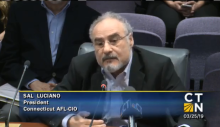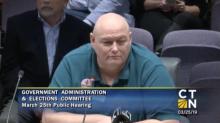
Luciano called certain aspects of Lamont's proposal "reckless and shortsighted" and "a recipe for disaster that threatens the public trust." He warned legislators not to roll back clean contracting reforms that could invite the level of corruption that forced the resignation and imprisonment of former Governor John Rowland. His full testimony can be read here.
The General Assembly worked hard to build responsible, transparent contracting and procurement protocols after former Governor John Rowland was sent to prison, including establishing the State Contracting Standards Board. The same cautious, deliberative approach was taken when authorizing public-private partnerships in 2011. Limits and restrictions were created to ensure taxpayer dollars were spent appropriately and transparently. There was a sincere effort to create a system that would not invite corruption or misuse taxpayer dollars.
SB 878 abolishes many of those carefully crafted protections. Among the safeguards removed in SB 878 are:
- Limit on the number of public-private partnerships that can be authorized. Current statute allows five projects between October 1, 2011 and January 1, 2020. Currently none exist.
- Limit on the duration of a public-private partnership project. Current statute limits the term to 50 years.
- The limit on the kinds of projects that can be considered for a public-private partnership. Current statute limits public-private partnerships to early childcare, health or housing facilities and transportation projects. This bill would allow any government function to be privatized.
- Oversight of the State Contracting Standards Board. Current statute requires the Board to perform a cost-benefit analysis to ensure responsible use of taxpayer funds.
- Legislative approval for type of project that can be considered beyond those already permitted in statute. The bill gives that authority to the Executive Branch.

The GAE Committee has until its JF Deadline, April 3, to take action on the proposal or it will be considered dead.
